Classic Commentaries and Studies on Hebrews (31 vols.)
Digital Logos Edition
Overview
The Classic Commentaries and Studies on the Book of Hebrews (31 vols.) offers some of the most significant classical studies on the book of Hebrews from the nineteenth and twentieth centuries. With notable authors such as Franz Delitzsch, Moses Stuart, A. B. Bruce, and G. A. Chadwick, Classic Commentaries and Studies on the Book of Hebrews (31 vols.) contains over 10,000 pages of interpretation, observations, translations, contextual history, and practical application. The 31 volumes contained in the Classic Commentaries and Studies on the Book of Hebrews (31 vols.) have had an enduring impact on New Testament exegesis, and this exceptional collection provides easy access to this wealth of significant scholarship.
This collection is essential for students, scholars, pastors, historians, teachers of the Bible, or anyone studying the book of Hebrews. With Logos Bible Software, this collection is completely searchable, with passages of Scripture appearing on mouse-over, as well as being linked to the Greek and Latin texts and English translations in your library. This makes these texts more powerful and easier to access than ever before for scholarly work or personal Bible study. With the advanced search features of Logos Bible Software, you can perform powerful searches by topic or Scripture reference—finding, for example, every mention of “new covenant” or “Hebrews 9:15.”

- Over 10,000 pages of notable scholarship on the book of Hebrews
- Noted authors from a variety of backgrounds
- Completely searchable, linked to your preferred Bible translation and the other books in your library
- Title: Classic Commentaries and Studies on Hebrews
- Volumes: 31
- Pages: 10,827
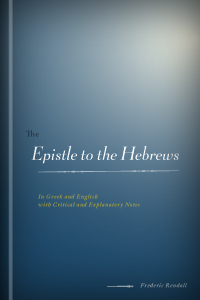
Stating that the book of Hebrews contributed to the doctrines of atonement and faith, Frederic Rendall moves expositionally through the text while examining semantics and historical background. Relying on the Westcott-Hort Greek New Testament for critical translation, Rendall provides extensive notes for further clarification.
Frederic Rendall was fellow of Trinity College, Cambridge and assistant headmaster of Harrow School. Rendall is also the author of The Acts of the Apostles in Greek and English and Theology of the Hebrew Christians.
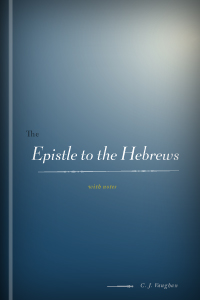
Providing critical interpretation combined with practical application, C. J. Vaughan disseminates the text verse-by-verse. Seeking to provide clarification on the intrinsic meaning of the original text, Vaughan elucidates textual criticism, historical context, figurative language, and semantics.
To the student desirous of acquiring an exact knowledge of the meaning of the words of the inspired writer, the notes cannot fail to be of the greatest service.
—The Scottish Review
C. J. Vaughan was dean of Llandaff and fellow of Trinity College, Cambridge.
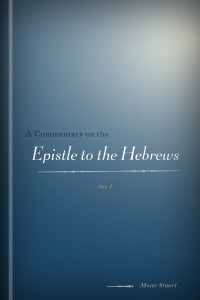
Moses Stuart’s A Commentary on the Epistle to the Hebrews provides exposition of the text with regard for semantic interpretation, historical context, and formulation of doctrine. Volume one focuses on explication of the text, authorship, canonical authority, and doctrinal arguments.
The volume before us is an elaborate and luminous critical introduction to the epistle of Hebrews . . . we hope, indeed, a wise and salutary influence.
—The North American Review
Moses Stuart (1780–1852) was an American Bible scholar, born in Connecticut. He was also a pastor and professor at Andover Theological Seminary. Called the “father of exegetical studies,” Stuart also trained over 100 missionaries. In addition to this commentary, Stuart also wrote Conscience and the Constitution, Commentary on the Epistle to the Romans, and Winer’s Greek Grammar of the New Testament.
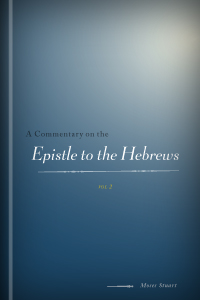
Moses Stuart’s A Commentary on the Epistle to the Hebrews provides exposition of the text with regard for semantic interpretation, historical context, and formulation of doctrine. Volume two walks verse-by-verse through the text while providing extensive clarification on key points.
The volume before us is an elaborate and luminous critical introduction to the epistle of Hebrews . . . we hope, indeed, a wise and salutary influence.
—The North American Review
Moses Stuart (1780–1852) was an American Bible scholar, born in Connecticut. He was also a pastor and professor at Andover Theological Seminary. Called the “father of exegetical studies,” Stuart also trained over 100 missionaries. In addition to this commentary, Stuart also wrote Conscience and the Constitution, Commentary on the Epistle to the Romans, and Winer’s Greek Grammar of the New Testament.
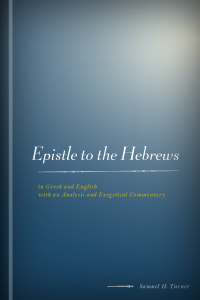
Discoursing on the book of Hebrews, Samuel H. Turner provides exegetical commentary on the text while comparing the Greek and English translations in order to examine inherent meaning. Noting the differences between denotation and cultural connotations in the text, Turner elucidates key principles and doctrines in the text.
The work is learned enough for scholars, and plain enough for all intelligent Christians. We hope he will be encouraged to go on in a labor, and his varied culture, so admirably qualify him.
—Church Review
This work, without the parade of learning, gives the result of much learned investigation, not omitting the processes of reasoning, by which those results have been reached. It is adapted alike for the use of those who can and those who cannot read the New Testament in the original, though, of course, the critical remarks can only be fully appreciated by those who are acquainted with New Testament Greek.
—Church Register
Samuel H. Turner (1790–1861) was professor of biblical interpretation at General Theological Seminary of the Protestant Episcopal Church.
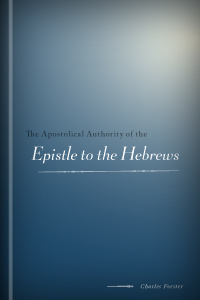
Examining the authorship, composition, and authenticity of the epistle to the Hebrews, Charles Forster offers thorough exposition of the text. Drawing upon extra-biblical sources and the early Church Fathers, Forster surveys the formulation and change in doctrines derived from the text over time.
He has unquestionably rendered a valuable contribution to the interpretation of the New Testament.
—The British Magazine and Monthly Register
Charles Forster was rector of Stisted, Essex and a minister at the Cathedral of Christ, Canterbury.
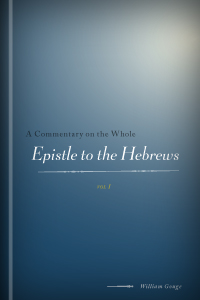
Focusing on explication of the text, William Gouge offers comprehensive exposition on the authorship, composition, practical application of doctrine, and the scope of the text. Volume one covers chapters one through five in extensive detail with regard for semantic and intended interpretation.
Except Owen on the Hebrews, no such critical and learned commentary on this important book is to be found in English theology.
—The British Quarterly Review
William Gouge, born in 1575, was educated at St. Paul’s School, London and at King’s College, Cambridge. Gouge was the late pastor at Blackfriars, London and rector of St. Ann’s.
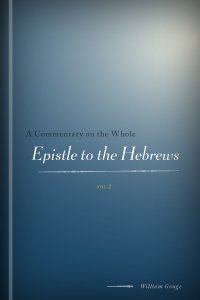
Focusing on explication of the text, William Gouge offers comprehensive exposition on the authorship, composition, practical application of doctrine, and the scope of the text. Volume two covers in detail chapters six through 10 with regard for semantic and intended interpretation.
Except Owen on the Hebrews, no such critical and learned commentary on this important book is to be found in English theology.
—The British Quarterly Review
William Gouge, born in 1575, was educated at St. Paul’s School, London and at King’s College, Cambridge. Gouge was the late pastor at Blackfriars, London and rector of St. Ann’s.
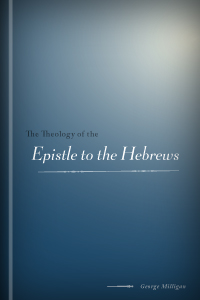
Articulating the importance of the book of Hebrews, George Milligan provides exposition of the text within historical context. Examining the text within light of interpretation by the early Church Fathers, Milligan develops authorship, usage of language, doctrinal teachings, and references from the Old Testament—as well as takes the time to explain the implications and parallels of figurative language within the text.
There is a clear and thoughtful exposition of the teaching of the epistle not only about the deity and humanity of our Lord, but also about his high priestly office and work. Mr. Milligan does not shrink from the truth emphasized in the epistle of the continuous character of the offering of Christ.
—The Church Quarterly Review
George Milligan was born in 1860 in Scotland. The son of a biblical studies professor, Milligan also became a prominent biblical scholar and professor at Glasgow University. He is well-known for his contributions to Greek New Testament studies. He died in 1934.
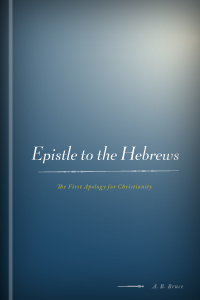
Distinguishing the book of Hebrews as a critical portion of the Christian religion, A. B. Bruce addresses the book of Hebrews in such a manner to convey both the implicit and explicit themes within the text. Bruce’s commentary covers the canonicity, authorship, scope, and doctrines within the book of Hebrews.
This book, the fruit of 30 years of study, is a companion volume to Professor Bruce’s The Kingdom of God, and St. Paul’s Conception of Christianity.
—T&T Clark
The epistle to the Hebrews becomes richer as we follow Dr. Bruce’s tender yet searching analysis of its thoughts and phrases.
—The London Quarterly and Holborn Review
A. B. Bruce was a Scottish theologian and minister of the Free Church of Scotland. Among his many works he authored The Chief End of Revelation, The Parabolic Teaching of Christ, and St. Paul’s Conception of Christianity.
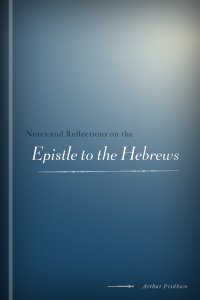
Offering extensive exposition on the epistle to the Hebrews, Arthur Pridham centers his commentary on annotation and practical application of the doctrines found in the text. Stating that the goal of studying Scripture should be spiritual and moral edification, Pridham provides coherent explanation of the text.
Its criticism is of a superior order, and its success in elucidating the meaning much makes the reader feel how truly the writer has had sympathy with the apostle’s spirit. The work is one of great value, and fitted to be of much service to the Church.
—Quarterly Journal of Prophecy
Adjusting in a useful proportion, doctrinal statement, and practical application. Its tone appears to be perfectly sound.
—Eclectic Review
Mr. Pridham is well acquainted with the original Scriptures, and his critical explanation of many obscure passage will repay the most careful attention.
—Primitive Church Magazine
Possesses the same qualities as its predecessor. In both epistles are found innumerable touches both of character and doctrine, such as afford the best materials for brief and impressive exposition.
—Baptist Magazine
Arthur Pridham is the author of numerous biblical commentaries, including Notes and Reflections on Romans, Notes and Reflections on the Epistle to the Hebrews, Notes and Reflections on the Epistle to the Ephesians, and more.
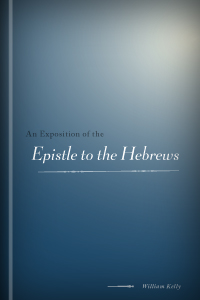
Walking through the text chapter-by-chapter, William Kelly expounds the text while giving special regard to historical context and interpretation. Contrasting redemption through Christ with redemption through the law, elucidates the structure of doctrine laid out in the text.
William Kelly (1823–1906), born in Ireland, moved to London after attending Trinity College in Dublin. Becoming highly involved with the Plymouth Brethren, he also became a prolific writer, earning the respect of theologians such as Henry Alford. He is quoted as having said “There are three things real—the Cross, the enmity of the world, the love of God.”
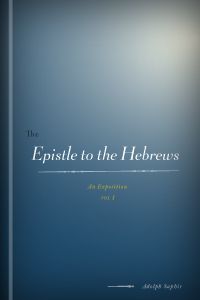
Comparing the old and new covenants, Adolph Saphir’s The Epistle to the Hebrews seeks to elucidate the crucial relationship between atonement in Christ and fulfillment through the law. Explicating structure, semantics, historical context, and exoteric doctrines within the text, Saphir supplies the reader with thorough exposition. Volume one covers chapters one through seven of the book of Hebrews.
Saphir’s Hebrews is considered a standard, and is highly commended by leading pastors and teachers, such as Dr. D. M. Stearns, Bishop Sabine, Dr. James M. Gray, Dr. C. I. Scofield, and many others. Adolph Saphir’s gift of exposition amounted to genius; his early Jewish training, his great literary abilities, and his deep spirituality combined to make this work the most illuminating and satisfying commentary on this great epistle extant.
—Homiletic Review: an international magazine of religion, theology
Adolph Saphir (1831–1891) was a notable Jewish theologian from Pesth, Hungary. Educated at Glasgow University, University of Aberdeen, University of Edinburgh, and the Free Church College in Edinburgh—Saphir went on to greatly influence the western understanding of Jewish culture and literature.
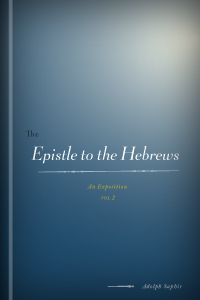
Comparing the old and new covenants, Adolph Saphir’s The Epistle to the Hebrews seeks to elucidate the crucial relationship between atonement in Christ and fulfillment through the law. Explicating structure, semantics, historical context, and exoteric doctrines within the text, Saphir supplies the reader with thorough exposition. Volume two covers chapters eight through 13 of the book of Hebrews.
Saphir’s Hebrews is considered a standard, and is highly commended by leading pastors and teachers, such as Dr. D. M. Stearns, Bishop Sabine, Dr. James M. Gray, Dr. C. I. Scofield, and many others. Adolph Saphir’s gift of exposition amounted to genius; his early Jewish training, his great literary abilities, and his deep spirituality combined to make this work the most illuminating and satisfying commentary on this great epistle extant.
—Homiletic Review: an international magazine of religion, theology
Adolph Saphir (1831–1891) was a notable Jewish theologian from Pesth, Hungary. Educated at Glasgow University, University of Aberdeen, University of Edinburgh, and the Free Church College in Edinburgh—Saphir went on to greatly influence the western understanding of Jewish culture and literature.
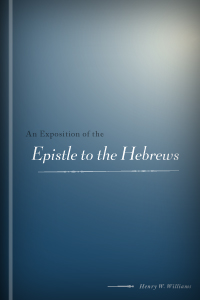
Expressing the importance of the doctrines found within the book of Hebrews, Henry W. Williams provides a comprehensive analysis of the text by examining authorship, intended audience, structure, and scope of the text. Conveying that literal renderings of language differ within the context of idioms and colloquial use, Williams attempts to assert the intended meaning of the original text.
Mr. Williams, as a clear and straightforward expositor of Methodist theology, is surpassed by none. His style is plain at the same time scholarly . . . we value this work ourselves, and hope it will be widely appreciated as its predecessor has been.
—The London Quarterly Review
Henry W. Williams, 19th century theologian and pastor, is also the author of The Incarnate Son of God, as well as Union with Christ.
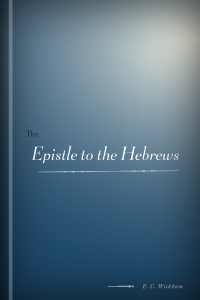
Providing a concise paraphrase of the text for elucidation of difficult passages, E. C. Wickham provides critical commentary on the authorship, purpose, and scope of the text. Wickham walks the reader through areas such as authorship, intent, and scope of the text for further comprehension.
E. C. Wickham (1834–1910) was educated at Winchester and New College, Oxford. Wickham went on to become headmaster of Wellington College, Dean of Lincoln from 1894–1910, and honorary fellow of New College, Oxford.
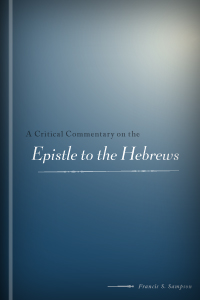
Originally compiled from a series of notes following the death of Francis S. Sampson, this commentary provides exhaustive exegesis on the audience, composition, authorship, structure, and scope of the text. Referencing the early Church Fathers for further historical clarification, Sampson examines the doctrinal points in the text with utmost regard for practical application. Emphasizing the literal rendering of the original Greek, the author provides a clear analysis of etymological use of language within the text.
Dr. Sampson adhered in the main to the views he thus expresses of the proper laws of interpretation, and has left a work highly creditable to himself and the Seminary with which he was connected, for its talent and learning, and adapted, from the principles on which it is written, to exert a salutary influence on others who use it as an assistant in the study of the Bible.
—The Theological and Literary Journal
Francis S. Sampson (1814–1854) was educated at the University of Virginia and the Union Theological Seminary before being ordained in 1839. Sampson went on to later become professor of oriental literature at Union Theological Seminary, VA.
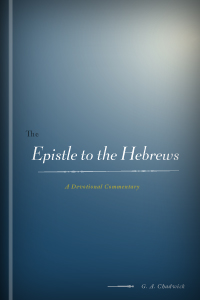
Articulating the distinctive doctrines within the epistle to the Hebrews, G. A. Chadwick offers concise commentary that thoroughly covers the function of the law in relationship to atonement through Christ. Walking through the text chapter-by-chapter, the author provides exposition on the authorship, style, and scope of the epistle. Leaning towards Pauline authorship, Chadwick reiterates and expounds the key themes found in the text.
G. A. Chadwick (1840–1923) was educated at Trinity College, Dublin before being ordained in 1863. Chadwick went on to later become rector of St. Mark’s, Armagh.
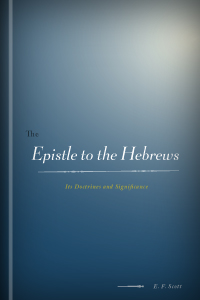
Seeking to elucidate the underlying ideas and themes within the epistle to the Hebrews, E. F. Scott offers succinct exposition of the text. Asserting a clear distinction between Church doctrines and the influence of Hellenistic thought in the text, Scott examines the intended themes within the text.
E. F. Scott (1868–1954) was professor of biblical theology and New Testament at Union Theological Seminary. Scott was well known for his authority on Christianity.
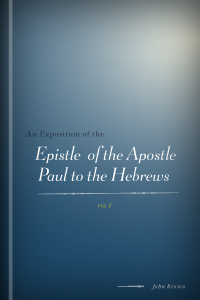
John Brown’s An Exposition of the Epistle of the Apostle Paul to the Hebrews, vol. 1 provides practical explication of the text while offering valuable elucidation on key topics such as: authorship, diction, canonicity, and scope of the epistle. Noting the significance of the epistle to the Hebrews, Brown provides extensive notes for further clarification and reading.
John Brown was a professor of exegetical theology to the United Presbyterian Church, and senior pastor of the United Presbyterian Congregation in Broughton Place, Edinburgh.
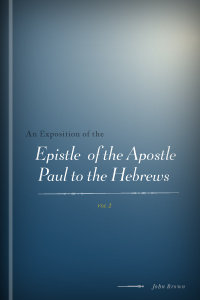
Arranged as a series of nine discourses, An Exposition of the Epistle of the Apostle Paul to the Hebrews offers comprehensive verse-by-verse exposition of the text. Focusing on the doctrinal implications of the epistle, John Brown coherently elucidates the figurative language and semantics found in the epistle.
John Brown was a professor of exegetical theology to the United Presbyterian Church, and senior pastor of the United Presbyterian Congregation in Broughton Place, Edinburgh.
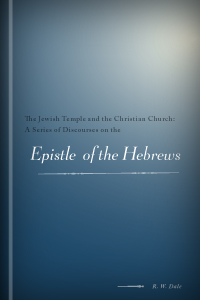
Exegetically moving through the epistle to Hebrews, R. W. Dale examines the formation of doctrine, authorship, and the importance of the old and new covenants. Contrasting the law with the new covenant, Dale offers thorough concise interpretation on the fulfillment of the law with regard to sacrifices, the priesthood, and redemption.
R. W. Dale (1829–1895) was educated at Springs Hill College, University of London, University of Glasgow, and Yale University. Dale primarily pastored Carr’s Lane Chapel from 1854–1895, and later went on to become chair of The Congregational Union of England and Wales.
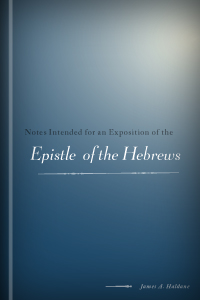
Published following the death of James A. Haldane, Notes Intended for an Exposition of the Epistle to the Hebrews engages the reader with verse-by-verse explication of the text. Attempting to illuminate and expound esoteric doctrines found in the text, Haldane provides thorough explanation of the epistle coupled with practical application.
We have here the work of a devout man, well known in Scotland through the last generation. The book, we repeat with pleasure, has much in it that will commend it to the Christian reader; and we doubt not that many will profit by its perusal.
—The Church of England Magazine
James A. Haldane (1768–1851) was born in Dundee, Scotland. After receiving his education at the University of Edinburgh, Haldane served as a midshipman and made multiple voyages to India. During a prolonged port detention, Haldane began studying the Bible. He decided to give up his naval career to pursue a religious life. In 1799 he was ordained the pastor of a large independent church in Edinburgh, which he pastored for over 50 years. Among his numerous publications include Man’s Responsibility, The Doctrine and Duty of Self Examination, and The Doctrine of Atonement.
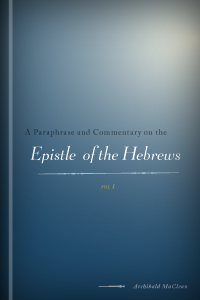
Discoursing on the doctrines found in the epistle to the Hebrews, Archibald M’Lean provides invaluable commentary that covers Pauline authorship, the exhortations of the text, interpretation of figurative and literal language, historical context, and the date of composition. Volume one walks verse-by-verse through chapters one through eight of Hebrews.
We are acquainted with no expository work in our language, which, within so small a compass, contains so much valuable matter, and truly scriptural illustration.
—Bibliotheca Biblia
Archibald M’Lean (1841–1911) was a pastor a Baptist Church in Edinburgh, Scotland. Known as one of the founders of the Scottish Baptist movement, M’Lean advocated for doctrinal reform across Scotland.
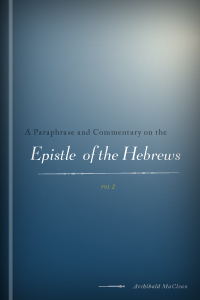
Discoursing on the doctrines found in the epistle to the Hebrews, Archibald M’Lean provides invaluable commentary that covers Pauline authorship, the exhortations of the text, interpretation of figurative and literal language, historical context, and the date of composition. Volume two walks verse by verse through chapters nine through 13—as well as provides a thorough index of illustrated scripture references from the commentary set.
We are acquainted with no expository work in our language, which, within so small a compass, contains so much valuable matter, and truly scriptural illustration.
—Bibliotheca Biblia
Archibald M’Lean (1841–1911) was a pastor a Baptist Church in Edinburgh, Scotland. Known as one of the founders of the Scottish Baptist movement, M’Lean advocated for doctrinal reform across Scotland.
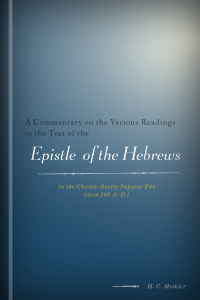
Exegetically examining the epistle to the Hebrews, H. C. Hoskier offers detailed exegesis on authorship, date of composition, semantic variation between translations, and vernacular use of language. Drawing upon other notable theologians and scholars such as Constantin von Tischendorf and Ebenezer Henderson for further elucidation on key subjects, Hoskier provides a succinct but illustrative examination of the text.
H. C. Hoskier (1864–1938) was a well known biblical scholar for his work comparing the Codex Vaticanus with the Codex Sinaiticus. Hoskier is also the author of many titles including Collation of the Greek, Concerning the Genesis of the Versions, Collation of the Latin Gold Uncial Evangelium in the Morgan Library, and Codex B and its Allies.
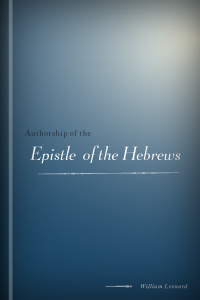
Focusing on the authorship of the epistle of Hebrews, William Leonard provides detailed exegesis that coherently ties together composition, use of vernacular language, and the assertion of heuristic versus theopneustic doctrines. Leonard draws upon notable authors such as Adolf Deissmann, Walter Bauer, and Gerhard Kittel to provide further clarification and context.
William Leonard was professor of sacred Scriptures at St. Patrick’s Seminary in Sydney.
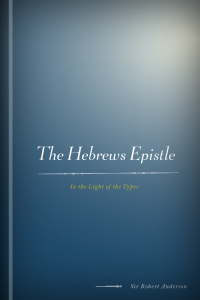
The Hebrews Epistle: In the Light of the Types
- Author: Sir Robert Anderson
- Publisher: James Nisbet & Co.
- Publication Date: 1911
- Pages: 184
Coupling exegesis with practical application, Sir Robert Anderson provides exposition of the character, authorship, doctrines, and composition of the text. Attempting to clarify key passages which are often misinterpreted, Anderson elucidates the epistle to the Hebrews while giving regard to semantic and intended interpretation.
Robert Anderson (1841–1918) served as chief of criminal investigation of Scotland Yard. In the midst of his many duties, he managed to gain a profound knowledge of the Bible, preach in various conferences, and write several books which have become classics.
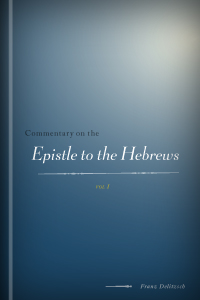
Known as being one of Franz Delitzsch’s finer exegetical works, Commentary on the Epistle to the Hebrews offers exposition of the text, textual criticism, semantic interpretation, and clarification on key doctrine. Volume one provides exegesis on chapters one through six.
In this present commentary his thorough acquaintance with both Rabbinical and Alexandrian Jewish literature enables him to take clear and strong grounds in regard to the process by which public religious thought was bridged over from the old covenant to the new.
—The Methodist Quarterly Review

Franz Delitzsch (1813–1890) was professor of theology at the University of Rostock from 1846–1850, and University of Erlangen from 1851–1867, and University of Leipzig from 1867–1890. Delitzsch is notable for his translation of the New Testament.
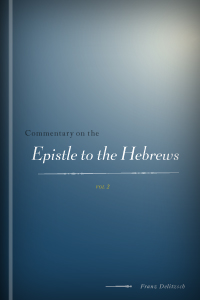
Known as being one of Franz Delitzsch’s finer exegetical works, Commentary on the Epistle to the Hebrews offers exposition of the text, textual criticism, semantic interpretation, and clarification on key doctrine. Volume two provides exegesis on chapters seven through 13.
In this present commentary his thorough acquaintance with both Rabbincal and Alexandrian Jewish literature enables him to take clear and strong grounds in regard to the process by which public religious thought was bridged over from the old covenant to the new.
—The Methodist Quarterly Review

Franz Delitzsch (1813–1890) was professor of theology at the University of Rostock from 1846–1850, and University of Erlangen from 1851–1867, and University of Leipzig from 1867–1890. Delitzsch is notable for his translation of the New Testament.
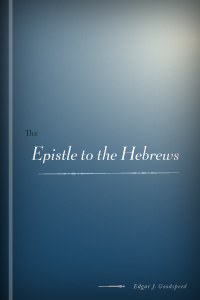
Focusing on critical exegesis, Edgar J. Goodspeed’s The Epistle to the Hebrews provides thorough commentary on the scope, canonicity, authorship, and literary qualities of the text. Goodspeed offers extensive notes for further clarification on key matters.
Prof. Goodspeed’s comments on the text illuminate the difficult passages and will prove a boon to the inquiring mind. He gives the needed assistance in understanding one of the less-used books of the New Testament.
—The Standard
Edgar Johnson Goodspeed (1871–1962) was educated at Denison University and the University of Chicago. Goodspeed went on to become professor of biblical literature and patristics at the University of Chicago in 1894. Goodspeed’s works include The Twelve: The Story of Christ’s Apostles, Problems of New Testament Translation, and The Apostolic Fathers: An American Translation.
Reviews
16 ratings

Forrest Cole
11/9/2021
James Young
2/28/2019

Kevin Bratcher
6/12/2018

M. David Johnson
3/27/2015
AeliusCicero
4/15/2014

Whyndell Grizzard
1/1/2014
Dennis Pulley
12/14/2013

Larry Proffitt (I
11/13/2013

RICHARD A. RAY
10/23/2013

Caleb Allen
10/12/2013